- 08008 20 20 80
Menu
Menu
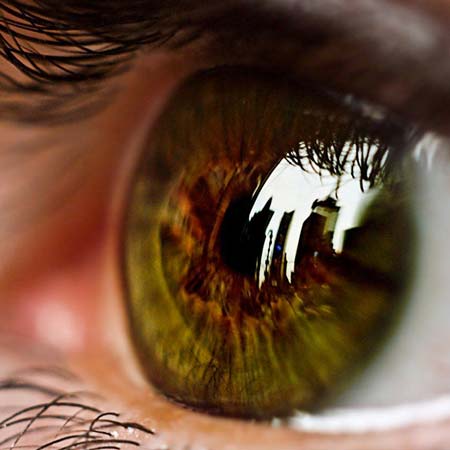
Vision can be severely affected if the cells of the macula are damaged and stop working. Symptoms include blurred vision or distortion, with straight lines appearing wavy and objects appearing to be an unusual size or shape. In more advanced cases, sufferers develop a blank patch or dark spot in the centre of their sight which makes reading, writing and recognising some objects difficult.
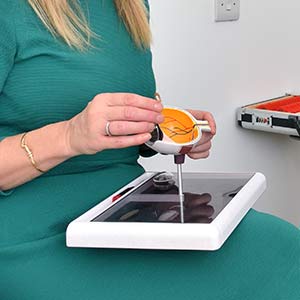
Dry macular degeneration tends to develop gradually and causes no pain. While no one knows exactly what causes the condition, it has been linked to heredity and environmental factors, like diet and smoking. In some cases, dry macular degeneration can progress into wet macular degeneration. Unfortunately, there is still no treatment for dry MD although we would recommend regular check up to monitor progress.
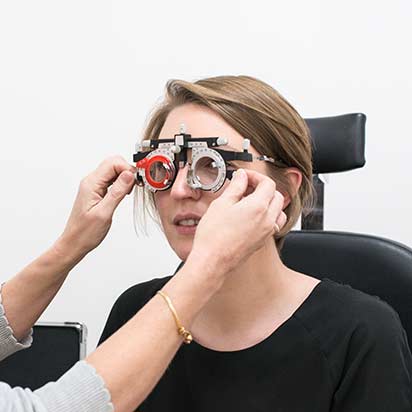
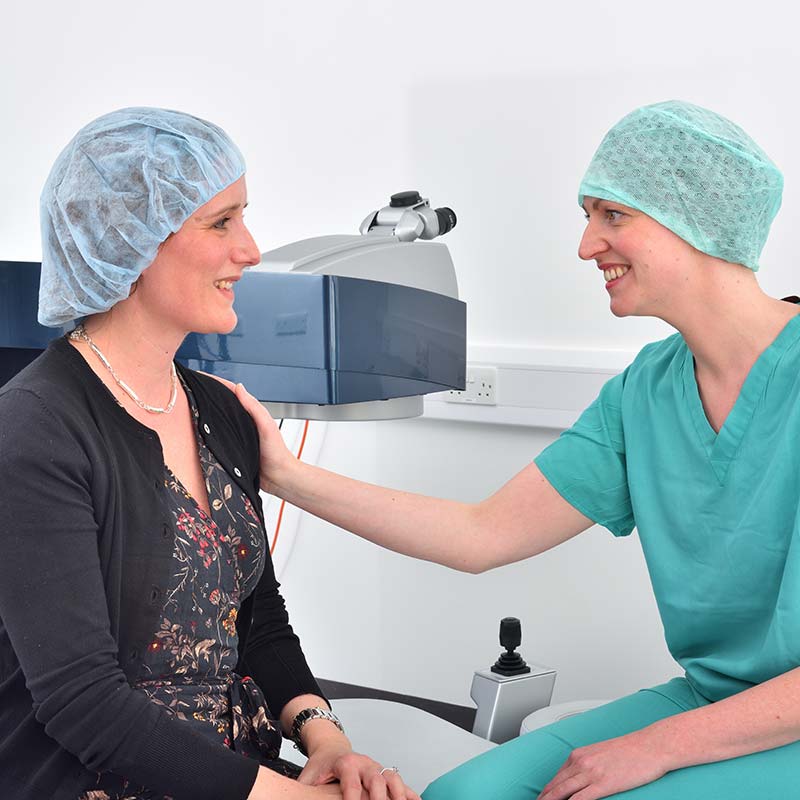
However, when the VEGF works less effectively, new blood vessels in the choroid layer (behind the retina) are weaker and so leak into the retinal layers. The anti-VEGF injections prevent new blood vessels from forming behind the retina, so there are no weak blood vessels to leak and cause the symptoms of wet MD.
Unfortunately though, damage to the macula can not be reversed. It is a common cause of permanent and severe sight loss in the UK.
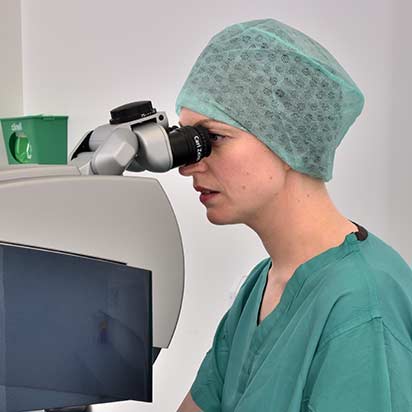
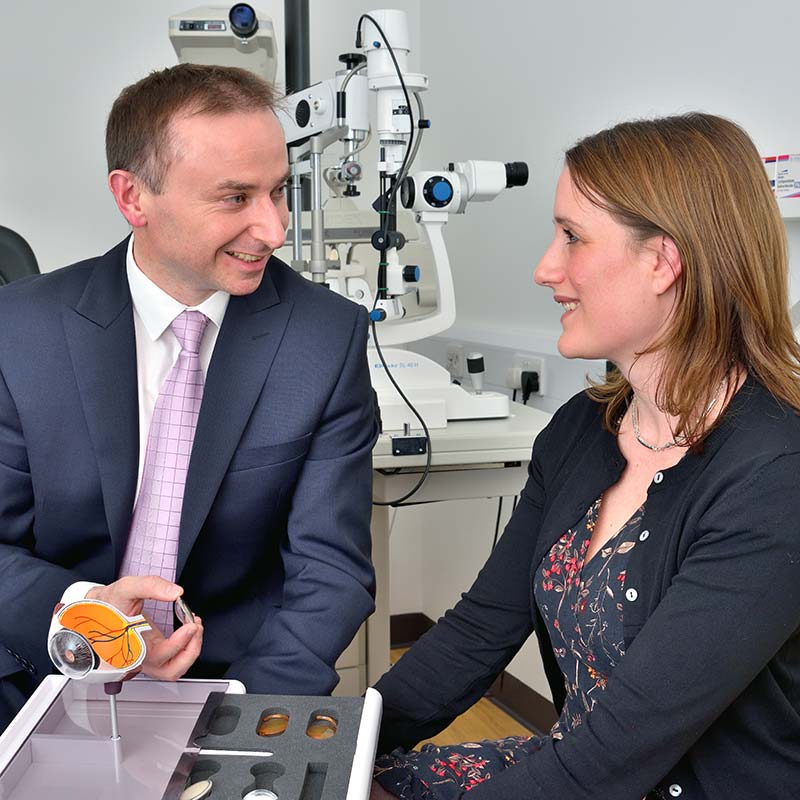
At your initial consultation, we’ll discuss your macular degeneration with you and carry out extensive tests on your eyes. A treatment plan will be established so you go home with peace of mind for the next steps in your treatment journey.
Your consultation is a time to meet your surgeon, ask any questions you have and even visit the laser suite to see where you’ll be having treatment. We can also book your treatment date.
If detected early enough, treatment can help prevent wet macular degeneration from getting worse, but unfortunately there is still no treatment for dry macular degeneration. For both types of macular degeneration, once damage has happened, it is irreversible. Treatment can slow progress of the disease though so always seek professional advice as soon as possible.
At your initial consultation, we’ll carry out extensive tests and let you know if you’re suitable for laser eye treatment and whether LASIK or LASEK would suit you best.
Your consultation is a time to meet your surgeon, ask any questions you have and even visit the laser suite to see where you’ll be having treatment. We can also book your treatment date.
If you’re found to be unsuitable for laser eye surgery, remember implantable lens surgery could be an option for you. This alternative treatment is often recommended for correcting reading prescriptions, high prescriptions and for some older patients who may get better results from lens replacement surgery.
On the day of treatment, you’ll be given local anaesthetic eye drops before the injection, and the area around your eye will be cleaned with an antiseptic.
Once the anaesthetic has taken affect, your consultant will inject the drug through the wall of the eye. The injection takes a few minutes and you’ll usually be able to go home about an hour later.
You may need regular repeat injections for the treatment to be successful – please ask your consultant for further advice.
On the day of treatment, you’ll be given local anaesthetic eye drops before the injection, and the area around your eye will be cleaned with an antiseptic.
Once the anaesthetic has taken affect, your consultant will inject the drug through the wall of the eye. The injection takes a few minutes and you’ll usually be able to go home about an hour later.
You may need regular repeat injections for the treatment to be successful – please ask your consultant for further advice.
Injection for wet MD is a relatively new treatment. Like all medical procedures, there are risks as well as benefits. Although a rise in pressure within the eye is expected immediately after the injection, occasionally an incision is required to release fluid from the eye if the pressure is too great.
In rare cases the inside of the eye can become infected. This can be serious and can lead to permanent loss of vision – antibiotic eye drops are used to reduce the risk of infection. Also in rare cases, the retina can become detached, which may require surgery. The chance of complications depends on the exact type of injection you’re having and other factors, such as your general health.
Your consultant will advise you on any risks that apply to you, as well as answer any questions you may have. Our expert eye surgeons have carried out over 10,000 eye operations each and put patient care at the heart of their work. Contact us for more information on treatment for macular degeneration.
Injection for wet AMD is a relatively new treatment. Like all medical procedures, there are risks as well as benefits. Although a rise in pressure within the eye is expected immediately after the injection, occasionally an incision is required to release fluid from the eye if the pressure is too great.
In rare cases the inside of the eye can become infected. This can be serious and can lead to permanent loss of vision – antibiotic eye drops are used to reduce the risk of infection. Also in rare cases, the retina can become detached, which may require surgery. The chance of complications depends on the exact type of injection you’re having and other factors, such as your general health.
Your consultant will advise you on any risks that apply to you, as well as answer any questions you may have. Our expert eye surgeons have carried out over 10,000 eye operations each and put patient care at the heart of their work. Contact us for more information on treatment for macular degeneration.
© 2019 Laser Vision Scotland. All rights reserved.